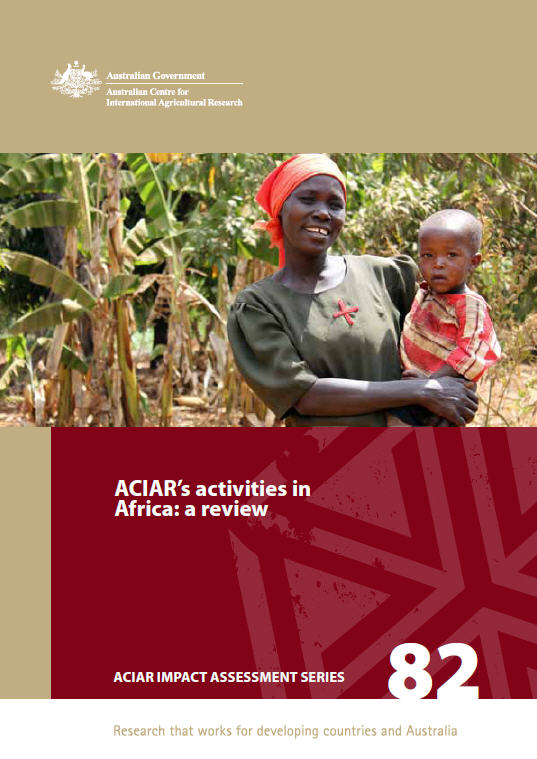- HomeHome
-
About ACIAR
- Our work
- Our people
-
Corporate information
- ACIAR Audit Committee
- Commission for International Agricultural Research
- Policy Advisory Council
- Agency reviews
- Executive remuneration disclosure
- Freedom of information (FOI)
- Gifts and benefits register
- Information publication scheme
- List of new agency files
- Contracts
- Legal services expenditure
- Privacy impact assessment register
- Commonwealth Child Safe Framework
- Benefits to Australia
- Careers
- 40 years of ACIAR
-
What we do
- Programs
- Cross-cutting areas
- Resources
- Where we work
-
Funding
- Research projects
- Fellowships
-
Scholarships
- John Allwright FellowshipScholarships to study in Australia for ACIAR partner country scientists to have Australian postgraduate qualifications
- ACIAR Pacific Agriculture Scholarships and Support and Climate Resilience Program
- Alumni Research Support Facility
- Publications
- News and Outreach
Impact assessment
ACIAR’s activities in Africa: a review
Date released
28 November 2012
Publication Code
IAS082
Overview
ACIAR has a long history of working with countries in Africa. Given the increasing attention to food security in Africa, leading to the establishment of ACIAR’s Australian International Food Security Centre, it is timely to review ACIAR’s experiences in Africa to date. Reviewing past projects can help guide future investment decisions by highlighting the types of projects that deliver the best returns and by identifying some of the barriers faced in different countries.
Related projects
Ticks and tick borne diseases: AS1/1983/003
Production of a seed culture of heat resistant Newcastle disease virus suitable for producing in developing countries: AS1/1995/040
Isolation and characterisation of micro-organisms from non-domesticated browsing ruminants in Africa capable of improving the utilisation of tannin containing shrub legumes: AS1/1995/111
Investigations into the control of Newcastle disease in village chickens in Mozambique: AS1/1996/096
Managing the rumen ecosystem to improve utilisation of thornless acacias: AS1/1998/010
Genetic variation, resistance to acaricides and immunological cross-reactivity in ticks that infest cattle in Zimbabwe and Australia: AS2/1990/047
Improved methods for the diagnosis and control of bovine babesiosis and anaplasmosis in Zimbabwe and Australia: AS2/1991/018
Development of phenotypic markers for resistance to gastrointestinal nematodes in African small ruminants: AS2/1993/724
Validation of the Australian model of the tick, Rhipicephalus appendiculatus, in Kenya and investigation of its use to facilitate collaboration with NARs: AS2/1996/014
Tick-borne diseases: Delivery of user-friendly and effective vaccine and diagnostics: AS2/1999/063
Bovine babesiosis and anaplasmosis: studies on field performance of live vaccines, diagnostic methods and host responses to infection: AS2/1996/090
Studies on genetic constraints to protective immunity in cattle: AS2/1996/203
Tropical forage and ley-legume technology for sustainable grazing and cropping systems in southern Africa: AS2/1996/149
Development and use of molecular genetic markers for enhancing the feeding value of cereal crop residues for ruminants: AS2/1997/098
Cassava safety: Development and evaluation of simple tests of the cyanogenic potential of cassava flour and cassava tubers: CP/1994/126
Cassava cyanide: improved techniques for estimation and influence of environment on concentration: CS2/1990/007
Australian hardwoods for fuelwood and agroforestry: FST/1983/020
Australian hardwoods for fuelwood and agroforestry: FST/1983/031
Casuarina for fuelwood and nitrogen fixation: FST/1983/057
Australian hardwoods for fuelwood and agroforestry: FST/1988/008
Australian hardwoods for fuelwood and agroforestry: FST/1988/009
Improvement in tree establishment for tropical dryland conditions in east Africa: FST/1991/026
Competitive interaction of trees and crops for water by agroforestry systems: FST/1995/107
High performance eucalypts and interspecific hybrids for marginal lands in south and eastern South Africa and south-eastern Australia: FST/1996/124
Assessment of eucalyptus rust as a pathogen of Eucalyptus species and other Myrtaceae, and development of sensitive methods for its detection in germplasm: FST/1996/206
Development and evaluation of sterile triploids and polyploid breeding methodologies for commercial species of Acacia in Vietnam, South Africa and Australia: FST/2003/002
Estimation of the cost of tick-borne disease to livestock in Africa, Asia and Australia: IAP/1996/181
Developing profitable beef business systems for previously disadvantaged farmers in South Africa: LPS/1999/036
Development of emerging farmer crop-livestock systems in northern RSA: LPS/2002/081
Pasture development for community livestock production in the Eastern Cape Province of South Africa: LPS/2004/022
Can we segment the South African market for beef palatability?: LPS/2008/013
Potential incentives for sustainable farming for food and water security, and poverty reduction in southern Africa: LWR/2011/015
Measurement and prediction of agrochemical movement in tropical sugar production: LWR1/1994/046
Improvement of dryland crop and forage production in the semi- arid tropics: LWR2/1987/035
System modelling at ICRISAT: Increasing the effectiveness of research on agricultural resource management in the semi-arid tropics by combining cropping systems simulation with farming systems research: LWR2/1996/049
Enhanced resource-use planning for tropical woodland agroecosystems: LWR2/1996/163
Capturing the benefits of seasonal climate forecasts in agricultural management: LWR2/1996/215
Risk management in southern African maize systems: LWR2/1997/038
Integrated nutrient management in tropical cropping systems: Improved capabilities in modelling and recommendations: SMCN/1999/003
Improving phosphorus availability in cropping systems in sub-Saharan Africa: SMCN/1999/004
Development and scaling out of targeted recommendations for smallholder maize systems in Southern Africa through integrating farmer participatory research and simulation modeling (Risk Management Project 2): SMCN/2001/028
Improved fertiliser recommendations and policy for dry regions of southern Africa: SMCN/2000/173




